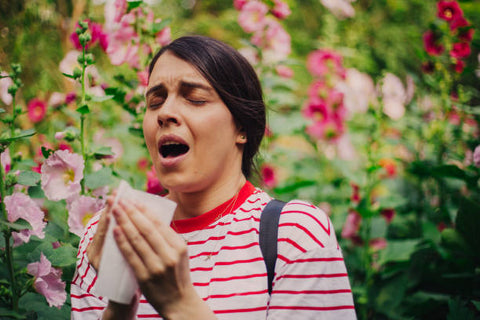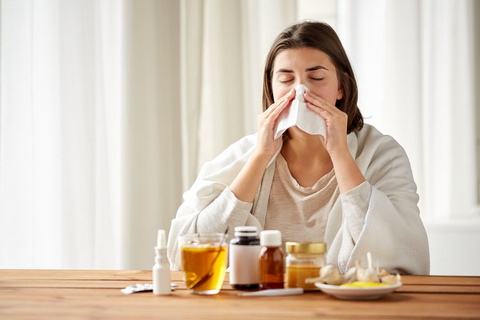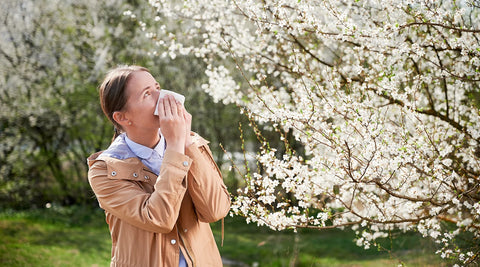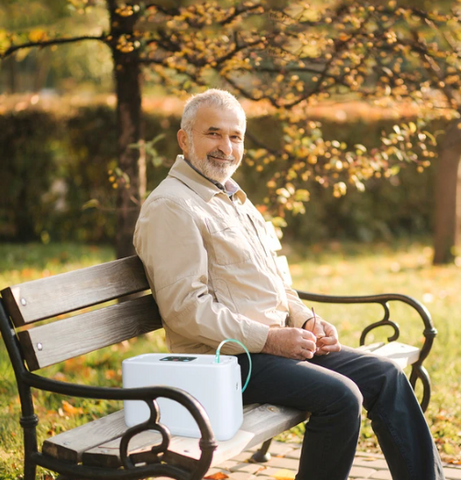COPD is a progressive lung disease resulting to having difficulty in breathing. Seasonal allergies, often referred to as hay fever, are an immune system response to airborne allergens like pollen, dust mites, and mold spores. While these allergens may not bother everyone, for people with COPD, they can trigger inflammation in the airways, worsening existing breathing problems.
Understanding How Seasonal Allergies Impact COPD
During a seasonal allergy attack, your body releases inflammatory chemicals in response to inhaled allergens. This inflammation can cause:

- Swollen airways: The lining of your airways becomes irritated and inflamed, narrowing the passages and making it harder to breathe.
- Increased mucus production: Your body produces more mucus to trap allergens, further obstructing the airways and making breathing difficult.
- Coughing and wheezing: These are your body's attempts to clear the airways of irritants and mucus.
These effects of seasonal allergies can significantly worsen existing COPD symptoms, leading to:

- Increased shortness of breath: Narrowed airways and excess mucus make it harder to get air in and out of your lungs.
- Wheezing: The sound of air whistling through narrowed airways.
- Chest tightness: A feeling of pressure or tightness in your chest due to difficulty breathing.
- Fatigue: Your body is working harder to breathe, leading to exhaustion.
- Increased risk of respiratory infections: Inflamed airways are more susceptible to infections, which can further worsen COPD symptoms.
Common Spring Allergens That Trigger COPD Issues
Knowing the most common spring allergens in your area can help you take steps to minimize exposure and manage your COPD symptoms more effectively. Here are some of the culprits:
- Tree Pollen: Tree pollen is typically released early in the spring, and its levels can vary depending on the specific tree species and weather conditions.
- Grass Pollen: Grass pollen becomes a major concern in late spring and early summer.
- Mold Spores: Mold thrives in damp environments, and its spores can be released into the air, particularly during rainy or humid weather.
Frequently Asked Questions (FAQ):

-
Q: Are there any natural remedies that can help manage both COPD and seasonal allergies?
-
A: Some natural remedies may offer some relief for symptoms. It's important to discuss these with your doctor before implementing them, as they may interact with your current medications.
- Nasal saline irrigation: Rinsing your nasal passages with a saline solution can help remove allergens and mucus, reducing congestion and irritation.
- Air purifiers: Using an air purifier with a HEPA filter can help remove allergens from your indoor air, improving your breathing comfort.
- Honey (for adults only): Honey has mild anti-inflammatory properties that may help soothe a cough or sore throat associated with allergies. However, it's important to note that honey is not safe for children under the age of one.
- Steam inhalation: Breathing in moist air from a humidifier or hot shower can help loosen mucus and ease congestion.
-
-
Q: I take medication for my COPD. Can I also take allergy medication?
- A: Yes, in most cases, you can safely take both COPD and allergy medications. However, it's important to consult with your doctor to ensure there are no interactions between your medications and to determine the right type and dosage of allergy medication for you.
-
Q: I'm worried about going outside during allergy season. How can I still enjoy the outdoors?
-
A: There are ways to minimize allergen exposure and still enjoy spending time outdoors. Here are some tips:
- Plan your outings for low pollen count days. Check pollen forecasts and limit outdoor activities when counts are high.
- Wear a pollen mask when outdoors, especially during peak allergy hours.
- Take your allergy medication as prescribed before going outside.
- Shower and change clothes after spending time outdoors to remove any allergens.
- Enjoy outdoor activities in the late afternoon or early evening when pollen counts are typically lower.
-
A: There are ways to minimize allergen exposure and still enjoy spending time outdoors. Here are some tips:
-
Q: I seem to get more respiratory infections during allergy season. Why is that?
-
A: Inflamed airways from allergies can make you more susceptible to respiratory infections. This is because the inflamed tissues have a harder time fighting off viruses and bacteria. Here are some tips to help prevent infections:
- Wash your hands frequently with soap and water, especially before eating, touching your face, or using your inhaler.
- Avoid close contact with people who are sick.
- Get a flu shot and pneumonia vaccine every year.
-
A: Inflamed airways from allergies can make you more susceptible to respiratory infections. This is because the inflamed tissues have a harder time fighting off viruses and bacteria. Here are some tips to help prevent infections:
How to Prevent Seasonal Allergies: An Ounce of Prevention is Worth a Pound of Cure
While medication can play a crucial role in managing seasonal allergies, there are steps you can take to minimize your exposure to allergens and potentially reduce the severity of your symptoms. Here are some proactive strategies:

- Know your triggers: Identify the specific allergens that bother you most. This information is crucial for developing a targeted prevention plan. Pollen counts are readily available online and through weather apps, allowing you to plan outdoor activities for low pollen days.
- Minimize outdoor exposure during peak allergy hours: Pollen counts are typically highest in the early morning and late afternoon. Plan outdoor activities for the middle of the day when pollen levels are lower.
- Keep your windows closed: This will help prevent allergens from entering your home, especially during high pollen count days.
- Use air conditioning with a HEPA filter: HEPA filters trap allergens like pollen and mold spores, improving indoor air quality and reducing your exposure.
- Change your air filters regularly: Replace air filters in your home air conditioning system and furnace according to the manufacturer's recommendations.
- Take your shoes off at the door: Pollen and other allergens can easily hitchhike on your shoes. Leaving them at the door helps prevent them from being tracked throughout your home.
- Shower and wash your hair after spending time outdoors: This will remove pollen and other allergens that may have collected on your skin and hair.
- Vacuum regularly: Vacuuming carpets and rugs helps remove allergens that have settled indoors. Consider using a HEPA-filtered vacuum cleaner for optimal allergen capture.
- Wash bedding in hot water: Dust mites, a common indoor allergen, can thrive in bedding. Washing sheets, pillowcases, and blankets in hot water (at least 130°F or 54°C) helps kill dust mites and reduce allergen levels.
By incorporating these preventive measures into your routine, you can significantly reduce your exposure to seasonal allergens and potentially experience a milder allergy season.
Treatment Options for COPD and Seasonal Allergies: Managing Your Symptoms for Optimal Breathing
While there is no cure for COPD or seasonal allergies, there are effective treatment options available to manage symptoms and improve your quality of life. Here's a look at some key strategies:

Managing COPD
- Medications: Bronchodilators relax the muscles in your airways, making it easier to breathe. Inhaled corticosteroids can help reduce inflammation in your airways.
- Pulmonary Rehabilitation: This program teaches you breathing exercises and techniques to improve your lung function and manage your COPD symptoms.
- Oxygen Therapy: For individuals with severe COPD, supplemental oxygen therapy can increase the amount of oxygen in your bloodstream, improving your breathing comfort and reducing shortness of breath.
Managing Seasonal Allergies
- Over-the-counter medications: Antihistamines can help block the release of histamine, a chemical released by your body during an allergic reaction. Decongestants can help shrink swollen nasal passages and improve breathing.
- Allergy shots (immunotherapy): This long-term treatment helps gradually reduce your sensitivity to specific allergens over time.
- Nasal corticosteroids: These sprays can help reduce inflammation in your nasal passages, easing congestion and runny nose.
How Oxygen Therapy Can Help
For people with COPD whose breathing difficulties are worsened by seasonal allergies, oxygen therapy can be a vital tool in managing their symptoms. Here's how it can help:
- Reduced Shortness of Breath: Supplemental oxygen increases the amount of oxygen available to your body, alleviating shortness of breath, a common symptom of both COPD and worsened allergies.
- Improved Exercise Tolerance: With adequate oxygen levels, you may experience increased stamina and a better ability to participate in physical activities.
- Enhanced Sleep Quality: Low blood oxygen levels can disrupt sleep. Oxygen therapy can help ensure you get the restful sleep you need to manage your overall health.
- Reduced Hospitalization Risk: Properly managed COPD with the help of oxygen therapy can potentially lower the risk of hospitalization due to respiratory complications.
Living with COPD and seasonal allergies doesn't have to limit your life. By following your doctor's treatment plan, incorporating preventative measures, and potentially using oxygen therapy, you can manage your symptoms effectively and breathe easier.
Living a Fulfilling Life with COPD and Seasonal Allergies
COPD and seasonal allergies can be a challenging combination to manage. However, by working closely with your doctor, taking proactive steps to minimize allergen exposure, and adhering to your treatment plans, you can minimize symptoms and live a full and active life.
At Oxygenvip, we understand the importance of managing respiratory conditions. We offer a wide range of home and portable oxygen concentrators to help individuals with COPD maintain their independence and quality of life. If you have questions about oxygen therapy or need assistance choosing the right concentrator for your needs, please don't hesitate to contact us.
















